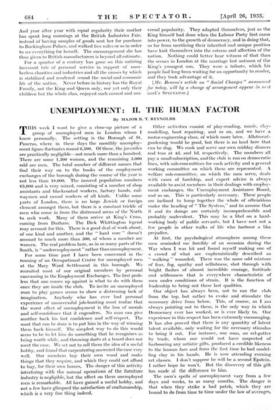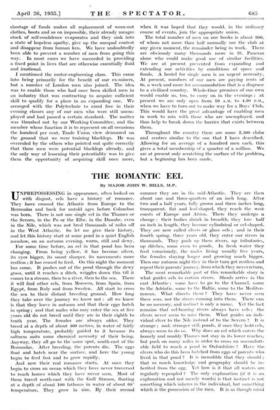UNEMPLOYMENT : II. THE HUMAN FACTOR
By MAJOR B. T. REYNOLDS
THIS week I want to give a close-up picture of a group of unemployed men in London whom I know personally. The setting is the Borough of St. Pancras, where in these days the monthly unemploy- ment figure fluctuates round 6,500. Of these, the juveniles are practically negligible—not much more than a hundred. There are sonic 1,500 women, and the remaining 5,000 odd are men. The total number of different names that find their way on to the books of the employment exchanges of the borough during the course of the year is not less than 18,000. The insured population numbers 65,000 and is very mixed, consisting of a number of shop assistants and blackcoated workers, factory hands, rail- waymen and casual workers of all kinds. Unlike sonic Farts of London, there is no large Jewish or foreign element amongst them, but there is a constant trickle of men who come in from the distressed areas of the North to seek work. Many of them arrive at King's Cross, coming from Durham. The Dick Whittington legend may account for this. There is a good deal of work about, of one kind and another, and the " hard core " doesn't amount to much more than 500, of whom a number arc women. The real problem here, as in so Many parts of the South, is " underemployment " rather than unemployment.
For some time past I have been concerned in the running of an Occupational Centre for unemployed men at the Mary Ward Settlement in this borough. We recruited most of our original members by personal canvassing in the Employment Exchanges. The first prob- lem that one conies up against is what to do with them once they are inside the club. To invite an unemployed man to play games seems to show a distressing lack of imagination. Anybody who has ever had personal experience of unsuccessful job-hunting must realize that the worst effect of unemployment is the loss of morale and self-confidence that it engenders. No man can give another back his lost confidence and self-respect. The most that can be done is to put him in the way of winning them back himself. The simplest way to do this would seem to be to let him do something that he recognizes as being worth while, and throwing darts at a board does not meet the case. We set out to sell them the idea of a useful hobby, and found that carpentering answered the ease very well. Our members buy their own wood and make things that they require, and which they could not afford to buy, for their own homes. The danger of this activity interfering with the normal operations of the furniture industry is negligible, but the effect on these unemployed men is remarkable. All have gained a useful hobby, and not a few have glimpsed the satisfaction of craftsmanship, which is a very fine thing indeed. Other activities consist of play-reading, music, clay- modelling, boot repairing, and so on, and we have a motor-engineering class, of which more later. Allotinent- gardening would be good, but there is no land here that can be dug. We cook and serve our own midday dinners and teas at 4d. and id. respectively. The members all pay a small subscription, and the club is run on democratic lines, with sub-committeeS for each activity and a general working committee on which these are represented. A welfare sub-committee, on which the men serve, deals with cases of hardship, and expert advice is always available to assist members in their dealings with employ- ment exchanges, the Unemployment Assistance Board, and so on. This is particularly necessary. These people are inclined to lump together the whole of officialdom under the heading of " The System," and to assume that it and its doings are certainly incomprehensible and probably malevolent. This may be a libel on a hard- working body of public servants, but I have- met not a few people in other walks of life who harbour a like prejudice.
At first, the psychological atmosphere among these men reminded me forcibly of an occasion during the War when I was hit and found myself making one of a crowd of what are euphemistically described as " walking " wounded. There was the same odd mixture of fear, fog, apathy and selfishness, shot through with bright flashes of almost incredible courage, fortitude and selflessness that is everywhere characteristic of men under conditions of strain. • It is the function of leadership to bring out these last qualities.
Our object has always been, not to run the club from the top, but rather to evoke and stimulate the necessary drive from below. This, of course, as I am always pointing out to them, is the only way in which Democracy ever has worked, or is ever likely to. Our experience in this respect has been extremely encouraging. It has also proved that there is any quantity of latent talent available, only waiting for the necessary stimulus to bring it out. For instance, one man, an eel-gutter by trade, whom one would not have suspected of harbouring any artistic gifts, produced a credible likeness to the human face and form the first time he had model- ling clay in his hands. He is now attending evening art classes. I don't suppose he will be a second' Epstein. I rather hope he won't. But the discovery of this gift has made al the difference to him.
The men's spells of unemployment vary from a few days and weeks, to as many months. The danger is that when they strike a bad patch, which they are bound to do from time to time under the law of averages, shortage of funds makes all replacement of worn-out clothes, boots and so on impossible, their already meagre. stock of self-confidence evaporates and they sink into a state of hopeless apathy, give up the unequal contest and disappear from human ken. We have undoubtedly. been able to prevent a number of men from going this way. In most cases we have succeeded in providing a fixed point in lives that are otherwise essentially fluid and irrational.
. I mentioned the motor-engineering class. This came into being primarily for the benefit of our ex-miners, but a number of London men also - joined. The idea was to enable those who had once been skilled men in an industry that was contracting to acquire sufficient skill to qualify for a place in an expanding one. We arranged with the Polytechnic to enrol free in their evening classes any of our men who were still unem- ployed and had passed a certain standard. The matter was thrashed out by our Working Committee, and the member whose function it is to represent on all occasions the hundred per cent. Trade Union view demurred on the ground that we were training blacklegs. He was Overruled by the others who pointed out quite correctly that these men were potential blacklegs already, and the only way of lessening their potentiality was to give them time opportunity of acquiring skill once more, when it was hoped that they would, in the ordinary course of events, join the appropriate union.
. The total number of men on our books is about 300, of whom not more than half normally use the club at any given moment, the remainder being in work. There are obviously many thousands more in St. Pancras. alone who could make good use of similar facilities. We are at present prevented from expanding and extending our activities by conditions of space and funds. A hostel for single men is an urgent necessity. At present, numbers of our men are paying rents of 6s. a week and more for accommodation that is a disgrace to a civilized country. Whole-time premises of our own would enable us, too, to carry on in the evenings ; at present we are only open from 10 A.M. to 4.30 P.M., when we have to turn out to make way for a Boys' Club: This would have the great advantage of enabling men in work to mix with those who are unemployed, and thus help to break down the barrier that exists between them.
Throughout the country there are some 2,500 clubs and centres similar to the one that I have described. Allowing for an average of a hundred men each, this gives a total membership of a quarter of a million. We are at present only scratching the surface of the problem, but a beginning has been made.











































 Previous page
Previous page